Young Researchers Program
‘Linking the food sovereignty debates’
CALL FOR APPLICATION
Deadline: Monday September 19th, 2016
Call HOTL Young Researchers Program
The Young Researchers Program, a mentorship programme by the Hands On the Land Alliance in cooperation with TNI, FIAN International and Friends of the Earth, is open for applications until the 19th of September. This program enables young engaged scholars and activists to strengthen their capacities around understanding food sovereignty and the human right to food, including opportunities for peer-to-peer learning, benefitting from the experience of mentors, and the opportunity to attend two main events as part of the research process.
HOTL seeks between 4 to 6 young[1] enthusiastic researchers who will collectively develop research that is relevant to the European Food Sovereignty movements, processes and struggles. The program will place the researchers into two research teams of two to three people paired with a mentor, with each team looking at one of the following cross cutting themes:
- The meaning/role of urban food policies for food sovereignty
As issues of urbanization consistently emerge on the global and regional agenda- the link to issues around food systems is becoming important. Many local-level city and metropolitan governments are beginning to embark on new food strategies that seek to relocate food systems at the “local” level.
While interesting initiatives are emerging, policy discourses have largely failed to sufficiently address the needs of civil society organizations and social movements, remaining restricted to limited conceptions of urban space while underplaying the important linkages and interactions with rural and peri-urban areas. As a result, policy discourses have sometimes perpetuated false solutions to issues of habitat, rural-urban linkages, environment and climate change, and natural resource governance under headings like “smart innovation”, “green economy” and “urban renewal” that implicitly mask displacement, discrimination and gentrification, and sometimes even go against the rights of communities struggling for their right to livelihoods, land, housing, water and food.
The key questions that this research will begin to explore should include the role of local and territorial governance, including specifically how to operationalize human rights obligations at the local level, the role of urban and territorial planning, new mechanisms of participatory governance, and ensuring a meaningful role for rural communities in policymaking.
- The understanding/shaping of consumption and distribution side of agroecology in European food systems.
Agroecology is a way of life for millions of women and men who prioritizes the development of a decent life in the territories over the search for profit. It is a series of production practices and consumption patterns, a scientific discipline as well as a social movement upon which to build food sovereignty.
Fundamental pillars of Agroecology include: collective rights and access to common property; solidarity between people, rural and urban villages; the diversity of knowledge and ways of building knowledge; recognition of the role of producers in innovation, research and breeding; and the recognition of the central role of women and youth. Agroecology aims at popular control over food systems, shifting control away from global markets and food monopolies. It confronts the homogenization of diets, using locally and culturally appropriate varieties, and improves the health of rural workers and consumers by not using agro-chemicals.. It also promotes the development of alternative institutions and mechanisms to support producers and consumers.
The central questions that this research will begin to explore should include: what role can the Solidarity Economy, Community Supported Agriculture (CSA) and public procurement, from the levels of local government to national development systems autonomous distribution play in supporting agroecology? What is the meaning of agroecology for European small-scale fishers? How to change consumption patterns and food diets and their impacts on health and nutrition? What role does education play in the transition to agro-ecological food systems? How can agroecology be a tool to advance gender justice?
The research will build upon the outcomes of discussions and debates held during two upcoming processes:
- The second edition of the Nyéléni Europe Forum For Food Sovereignty, which will take place in Cluj Napoca, Romania, between 26-30 October 2016 (http://nyelenieurope.net/). It aims to catalyze and bring existing food sovereignty initiatives together, as well as to connect people, strengthen the work we do locally, nationally or regionally, and build a pan-European movement for food sovereignty. The forum will build on the outcomes of the first forum held in Krems, Austria in 2011 and on the developments since then. The key thematic axes around which the Forum will be structured include:
- How food is produced and consumed
- How food is distributed
- Valuing work and improving social conditions in food & agricultural systems
- Reclaiming the right to natural resources and the Commons
- Changing public policies governing our food and agricultural systems.
- The International seminar on Local Public Policies for Food Sovereignty (LPPFS) will take place in Donostia, in the Basque Country in Spain, on November 16-17 2016. Bringing together actors from local authorities and civil society organisations, the seminar’s goals are
- to support the convergence of struggles of fishermen, farmers and other sectors for developing holistic food policies;
- to promote social activism around food sovereignty, from consumption and production to all relevant areas such as distribution, processing and marketing of food;
- to promote food as a fundamental right and not a commodity merchandise and to strengthen the dimensions of food sovereignty that address food justice;
- to provide examples-specific experiences from and lessons of existing initiatives;
- to discuss and propose tools to influence the creation of local public policies championing food sovereignty;
- to generate a working space for the adoption of a common position from Via Campesina Europe on local governance (municipal) and opportunities to build food sovereignty from the territories and with the participation of different social sectors, through concrete projects;
- to discuss the need to link the struggles, processes and initiatives at the local level with different (inter)national levels;
As a result, interested researchers should be available to join both events, where they will have the opportunity to carry out interviews with key persons, attend presentations and solicit inputs on their research topic.
The research will produce two written outputs in the form of focussed research briefs, with a target length of around 15-20 pages, to be published as part of a HOTL collection. The publication should be written in an accessible and captivating style that appeals to a broad audience.
Researchers will be expected to work within the following preliminary timeline:
| September | Carry out background preliminary research |
| October 2016 | Develop research questions and preliminary outline; submit for review |
| October and November | Attend the events |
| November – mid-January | Write and submit first full draft |
| February | Produce revised final draft |
| March 2017 | Publication date |
The programme provides a travel stipend for each young researcher to cover costs of travel to Nyeleni and to the Seminar – as well as a small honorarium.
How to apply:
Interested researchers are encouraged to send, in English or Spanish, a max 1. page explanation outlining their motivation for one of the research topic, attaching their resume and a short writing sample to youngresearchers@tni.org
Please indicate in the email subject which topic you are applying for.
The deadline to submit the application is September 19th, 2016.
About the Young Researchers Program
The Young Researchers Program is a pilot initiative drawing upon the work started by the Critical Agrarian Studies network (ICAS). It is premised upon the importance of research and education as key tools to support the construction of alternatives in food sovereignty. The initiative aims at fostering coordinated research efforts and mutually reinforcing synergies between various on-going processes geared towards strengthening food sovereignty in Europe.
The Young Researchers Program Partners
The HOTL alliance. Hands on the Land for Food Sovereignty is a collective campaign by 16 partners. It includes peasants and social movements, development and environmental NGO, human rights organisations and research activists. The alliance aims to raise awareness on the use and governance of land, water and other natural resources and its effects on the realisation of the right to food and food sovereignty. See: https://handsontheland.net/about/who-are-we/
Transnational Institute. TNI’s mission is to strengthen international social movements with rigorous research, reliable information, sound analysis and constructive proposals that advance progressive, democratic policy change and common solutions to global problems. In so doing, TNI acts as a unique nexus between social movements, engaged scholars and policy makers. See: https://www.tni.org/en
FIAN International. FIAN’s mission is to expose violations of people’s right to food wherever they may occur. We stand up against unjust and oppressive practices that prevent people from feeding themselves. The struggle against gender discrimination and other forms of exclusion is integral part of our mission. We strive to secure people’s access to the resources that they need in order to feed themselves, now and in the future. See: http://www.fian.org
Friends of the Earth International. FoEI is the world’s largest grassroots environmental network, uniting 76 national member groups and some 5,000 local activist groups on every continent. With over 2 million members and supporters around the world, we campaign on today’s most urgent environmental and social issues. We challenge the current model of economic and corporate globalization, and promote solutions that will help to create environmentally sustainable and socially just societies. See: http://foei.org
[1] Young in this context is flexibly interpreted to mean either young in age or to refer to someone who is starting out in their personal development of these topics and is eager to gain experience and learn more.
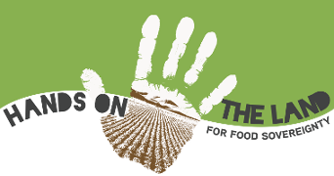
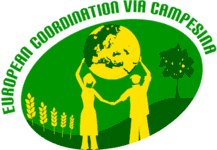
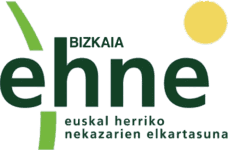

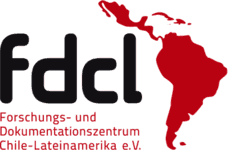
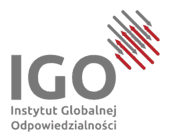
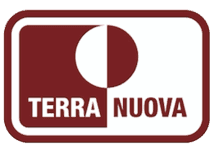
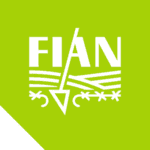
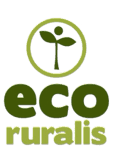


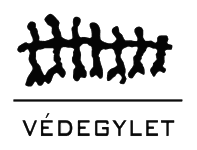
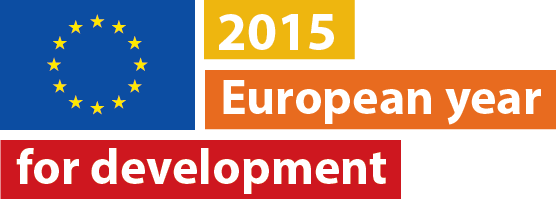
 This campaign is financially supported by the European Commission. The views expressed herein are not of the EC.
This campaign is financially supported by the European Commission. The views expressed herein are not of the EC.